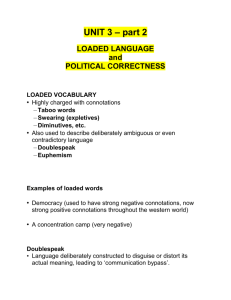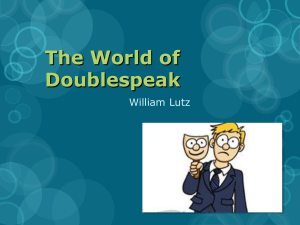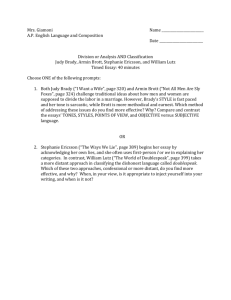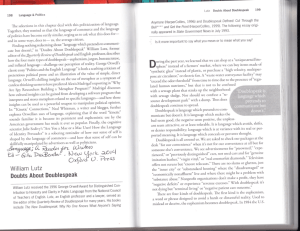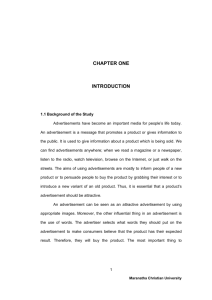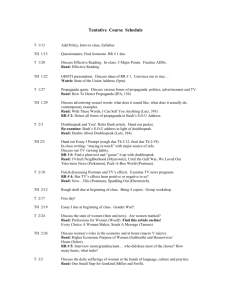LANGUAGE, APPEARANCE, AND REALITY: Doublespeak in 1984t
advertisement
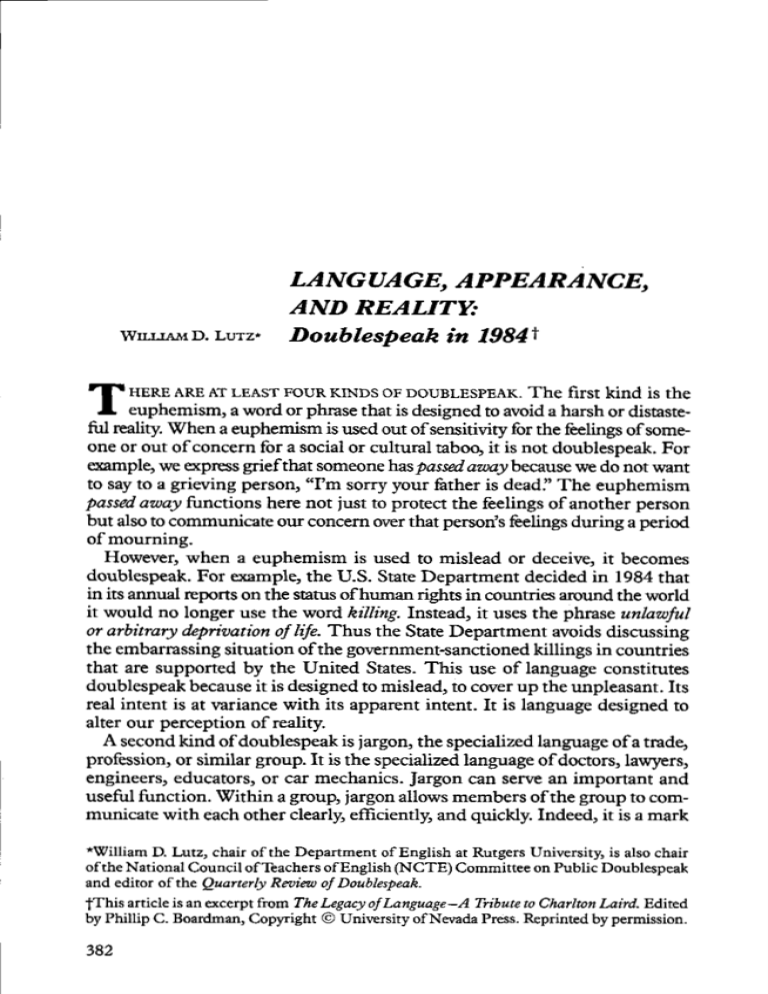
WILLIAM D. LUTZ* T LANGUAGE, APPEARANCE, AND REALITY: Doublespeak in 1984t The first kind is the euphemism, a word or phrase that is designed to avoid a harsh or distasteful reality. When a euphemism is used out of sensitivity for the feelings of someone or out of concern for a social or cultural taboo, it is not doublespeak . For example, we express grief that someone has passed away because we do not want to say to a grieving person, "I'm sorry your father is dead ." The euphemism passed away functions here not just to protect the feelings of another person but also to communicate our concern over that person's feelings during a period of mourning . However, when a euphemism is used to mislead or deceive, it becomes doublespeak . For example, the U.S . State Department decided in 1984 that in its annual reports on the status of human rights in countries around the world it would no longer use the word killing. Instead, it uses the phrase unlawful or arbitrary deprivation of life. Thus the State Department avoids discussing the embarrassing situation of the government-sanctioned killings in countries that are supported by the United States . This use of language constitutes doublespeak because it is designed to mislead, to cover up the unpleasant . Its real intent is at variance with its apparent intent . It is language designed to alter our perception of reality. A second kind of doublespeak is jargon, the specialized language of a trade, profession, or similar group. It is the specialized language of doctors, lawyers, engineers, educators, or car mechanics . Jargon can serve an important and useful function . Within a group, jargon allows members of the group to communicate with each other clearly, efficiently, and quickly . Indeed, it is a mark HERE ARE AT LEAST FOUR KINDS OF DOUBLESPEAK . *William D. Lutz, chair of the Department of English at Rutgers University, is also chair of the National Council of Teachers of English (NCTE) Committee on Public Doublespeak and editor of the Quarterly Review of Doublespeak . tThis article is an excerpt from The Legacy of Language-A Tribute to Charlton Laird. Edited by Phillip C . Boardman, Copyright © University of Nevada Press . Reprinted by permission . 382 LANGUAGE, APPEARANCE, AND REALITY 383 of membership in the group to be able to use and understand the group's jargon . For example, lawyers speak of an involuntary conversion of property when discussing the loss or destruction of property through theft, accident, or condemnation . When used by lawyers in a legal situation, such jargon is a legitimate use of language, since all members of the group can be expected to understand the term. However, when a member of the group uses jargon to communicate with a person outside the group, and uses it knowing that the nonmember does not understand such language, then there is doublespeak . For example, a number of years ago a commercial airliner crashed on takeoff, killing three passengers, injuring twenty-one others, and destroying the airplane, a 727 . The insured value of the airplane was greater than its book value, so the airline made a profit of three million dollars on the destroyed airplane . But the airline had two problems : it did not want to talk about one if its airplanes crashing and it had to account for the three million dollars when it issued its annual report to its stockholders . The airline solved these problems by inserting a footnote in its annual report explaining that this three million dollars was due to "the involuntary conversion of a 727 ." Note that airline officials could thus claim to have explained the crash of the airplane and the subsequent three million dollars in profit . However, since most stockholders in the company, and indeed most of the general public, are not familiar with legal jargon, the use of such jargon constitutes doublespeak . A third kind of doublespeak is gobbledygook or bureaucratese . Basically, such doublespeak is simply a matter of piling on words, of overwhelming the audience with words, the bigger the better . For example, when Alan Greenspan was chairman of the President's Council of Economic Advisors, he made this statement when testifying before a Senate committee : It is a tricky problem to find the particular calibration in timing that would be appropriate to stem the acceleration in risk premiums created by falling incomes without prematurely aborting the decline in the inflation-generated risk premiums . Did Alan Greenspan's audience really understand what he was saying? Did he believe his statement really explained anything? Perhaps there is some meaning beneath all those words, but it would take some time to search it out . This seems to be language that pretends to communicate but does not . The fourth kind of doublespeak is inflated language . Inflated language designed to make the ordinary seem extraordinary, the common, uncommon ; to make everyday things seem impressive ; to give an air of importance to people, situations, or things that would not normally be considered important ; to make the simple seem complex . With this kind of language, car mechanics become automotive internists, elevator operators become members of the vertical transportation corps, used cars become not just pre-owned but experienced cars. When the Pentagon uses the phrase pre-emptive counterattack to mean that American forces attacked first, or when it uses the phrase engage the enemy on all sides 384 Et cetera • WINTER 1987 to describe an ambush of American troops, or when it uses the phrase tactical redeployment to describe a retreat by American troops, it is using doublespeak . The electronics company that sells the television set with non-multicolor capability is also using the doublespeak of inflated language. Doublespeak is not a new use of language peculiar to the politics or economics of the twentieth century. Thucydides in The Peloponnesian War wrote that revolution thus ran its course from city to city . . . . Words had to change their ordinary meanings and to take those which were now given them . Reckless audacity came to be considered the courage of a loyal ally ; prudent hesitation, specious cowardice ; moderation was held to be a cloak for unmanliness ; ability to see all sides of a question, inaptness to act on any. Frantic violence became the attribute of manliness ; cautious plotting, a justifiable means of self-defense . The advocate of extreme measures was always trustworthy ; his opponent, a man to be suspected . (1) Caesar in his account of the Gallic Wars described his brutal conquest as "pacifying" Gaul . Doublespeak has a long history. Military doublespeak seems always to have been with us . In 1947 the name of the War Department was changed to the more pleasing if misleading Defense Department. During the Vietnam War the American public learned that it was an incursion, not an invasion ; a protective reaction strike or a limited duration protective reaction strike or air support, not bombing ; and incontinent ordinance, not bombs and artillery shells, fell on civilians . This use of language continued with the invasion of Grenada, which was conducted not by the United States Army, Navy, or Air Force, but by the Caribbean Peace Keeping Forces . Indeed, according to the Pentagon, it was not an invasion of Grenada, but a predawn, vertical insertion . And it wasn't that the armed forces lacked intelligence data on Grenada before the invasion, it was just that "we were not micromanaging Grenada intelligencewise until about that time frame :' In today's army forces, it's not a shovel but a combat emplacement evacuator, not a toothpick but a wood interdental stimulator, not a pencil but a portable, handheld communications inscriber, not a bullet hole but a ballistically induced aperture in the subcutaneous environment. Members of the military and politicians are not the only ones who use doublespeak . People in all parts of society us it . Take educators, for example . On some college campuses what was once the Department of Physical Education is now the Department of Human Kinetics or the College of Applied Life Studies. Home Economics is now the School of Human Resources and Family Studies. College campuses no longer have libraries but learning resource centers . Those are not desks in the classroom, they are pupil stations . Teachersclassroom managers who apply in action plan to a knowledge base-are concerned with the basic fundamentals, which are inexorably linked to the education user's not student's) time-on-task . Students don't take tests ; now it is criterion referencing testing which measures whether a student has achieved the operational curricular objectives. A school system in Pennsylvania uses the following grading . LANGUAGE, APPEARANCE, AND REALITY 385 system on report cards : "no effort, less than minimal effort, minimal effort, more than minimal effort, less than full effort, full effort, better than full effort, effort increasing, effort decreasing" Some college students in New York come from economically nonaffluent families, while the coach at a Southern university wasn't fired, "he just won't be asked to continue in that job ." An article in a scholarly journal suggests teaching students three approaches to writing to help them become better writers : "concretization of goals, procedural facilitation, and modeling planning ." An article on family relationships entitled "Familial Love and Intertemporal Optimality" observes that "an altruistic utility function promotes intertemporal efficiency . However, altruism creates an externality that implies that satisfying the condition for efficiency, does not insure intertemporal optimality?" A research report issued by the U .S . Office of Education contains this sentence : "In other words, feediness is the shared information between toputness, where toputness is at a time just prior to the inputness ;' Educations contributes more than its share to current doublespeak . The world of business has produced large amounts of doublespeak . If an airplane crash is one of the worst things that can happen to an airline company, a recall of automobiles because of a safety defect is one of the worst things that can happen to an automobile company. So a few years ago, when one of the three largest car companies in America had to recall two of its models to correct mechanical defects, the company sent a letter to all those who had bought those models . In its letter, the company said that the rear axle bearings of the cars "can deteriorate" and that "continued driving with a failed bearing could result in disengagement of the axle shaft and adversely affect vehicle control ." This is the language of nonresponsibility . What are "mechanical deficiencies" poor design, bad workmanship? If they do, what causes the deterioration? Note that "continued driving" is the subject of the sentence and suggests that it is not the company's poor manufacturing which is at fault but the driver who persists in driving. Note, too, "failed bearing;' which implies that the bearing failed, not the company. Finally, "adversely affect vehicle control" means nothing more than that the driver could lose control of the car and get killed . If we apply Hugh Rank's criteria for examining such language, we quickly discover the doublespeak here . What the car company should be saying to its customers is that the car the company sold them has a serious defect which should be corrected immediately- otherwise the customer runs the risk of being killed . But the reader of the letter must find this message beneath the doublespeak the company has used to disguise the harshness of its message . We will probably never know how many of the customers never brought their cars in for the necessary repairs because they did not think the problem serious enough to warrant the inconvenience involved . When it comes time to fire employees, business has produced more than enough doublespeak to deal with the unpleasant situation . Employees are, of course, never fired . They are selected out, placed out, non-retained, released, dehired, 386 Et cetera • WINTER 1987 or non-renewed. A corporation will eliminate the redundancies in the human resources area, assign candidates for derecruitment to a mobility pool, revitalize the department by placing executives on special assignment, enhance the efficiency of operations, streamline the field sales organization, or further rationalize marketing efforts . The reality behind all this doublespeak is that companies are firing employees, but no one wants the stockholders, public, or competition to know that times are tough and people have to go . Recently the oil industry has been hard hit by declining sales and a surplus of oil. Because of reduced demand for product, which results in spare refining capacity and problems in down-stream operations, oil companies have been forced to re-evaluate and consolidate their operations and take appropriate cost reduction actions, in order to enhance the efficiency of operations, which has meant the elimination of marginal outlets, accelerating the divestment program, and the disposition of low throughput marketing units . What this doublespeak really means is that oil companies have fired employees, cut back on expenses, and closed gas stations and oil refineries because there's surplus of oil and people are not buying as much gas and oil as in the past . One corporation faced with declining business sent a memorandum to its employees advising them that the company's "business plans are under revision and now reflect a more moderate approach toward our operating and capital programs' The result of this "more moderate approach" is a "surplus of professional/technical employees ." To "assist in alleviating the surplus, selected professional and technical employees" have been "selected to participate" in a "Voluntary Program" Note that individuals were selected to "resign voluntarily :' What this memorandum means, of course, is that expenses must be cut because of declining business, so employees will have to be fired . It is rare to read that the stock market fell. Members of the financial community prefer to say that the stock market retreated eased, made a technical adjustment or a technical correction, or perhaps that prices were off due to profit taking, or off in light trading, or lost ground. But the stock market never falls, not if stockbrokers have their say. As a side note, it is interesting to observe that the stock market never rises because of a technical adjustment or correction, nor does it ever ease upwards . The business sections of newspapers, business magazines, corporate reports, and executive speeches are filled with words and phrases such as marginal rates of substitution, equilibrium price, getting off margin, distribution coalition, nonperforming assets, and encompassing organizations. Much of this is jargon or inflated language designed to make the simple seem complex, but there are other examples of business doublespeak that mislead, that are designed to avoid a harsh reality. What should we make of such expressions as negative deficit or revenue excesses for profit, invest in for buy, price enhancement or price adjustment for price increase, shortfall for a mistake in planning or period of accelerated negative growth or negative economic growth for recession? Business doublespeak often attempts to give substance to wind, to make ordi- LANGUAGE, APPEARANCE, AND REALITY 387 nary actions seem complex . Executives operate in timeframes within the context of which a task force will serve as the proper conduit for all the neccessary input to program a scenario that, within acceptable parameters, and with the proper throughput, will generate the maximum output for a print out of zero defect terminal objectives that will enhance the bottom line. There are instances, however, where doublespeak becomes more than amusing, more than a cause for a weary shake of the head . When the anesthetist turned the wrong knob during a Caesarean delivery and killed the mother and unborn child, the hospital called it a therapeutic misadventure The Pentagon calls the neutron bomb "an efficient nuclear weapon that eliminates an enemy with a minimum degree of damage to friendly territory." The Pentagon also calls expected civilian casualties in a nuclear war collateral damage. And it was the Central Intelligence Agency which during the Vietnam War created the phrase eliminate with extreme prejudice to replace the more direct verb kill. Identifying doublespeak can at times be difficult . For example, on July 27, 1981, President Ronald Reagan said in a speech televised to the American public : "I will not stand by and see those of you who are dependent on Social Security deprived of the benefits you've worked so hard to earn. You will continue to receive your checks in the full amount due you" This speech had been billed as President Reagan's position on Social Security, a subject of much debate at the time . After the speech, public opinion polls revealed that the great majority of the public believed that President Reagan had affirmed his support for Social Security and that he would not support cuts in benefits . However, five days after the speech, on July 31, 1981, an article in the Philadelphia Inquirer quoted White House spokesman David Gergen as saying that President Reagan's words had been "carefully chosen ." What President Reagan did mean, according to Gergen, was that he was reserving the right to decide who was "dependent" on those benefits, who had "earned" them, and who, therefore, was "due" them . (2) The subsequent remarks of David Gergen reveal the real intent of President Reagan as opposed to his apparent intent . Thus Hugh Rank's criteria for analyzing language to determine whether it is doublespeak, when applied in light of David Gergen's remarks, reveal the doublespeak of President Reagan . Here indeed is the insincerity of which Orwell wrote . Here, too, is the gap between the speaker's real and declared arm . In 1982 the Republican National Committee sponsored a television advertisement which pictured an elderly, folksy postman delivering Social Security checks "with the 7.4% cost-of-living raise that President Reagan promised :' The postman then added that "he promised that raise and he kept his promise, in spite of those sticks-in-the-mud who tried to keep him from doing what we elected him to do.' The commercial was, in fact, deliberately misleading . The cost-of-living increases had been provided automatically by law since 1975, and President Reagan tried three times to roll them back or delay them but was overruled by congressional opposition . When these discrepancies were 388 Et cetera • WINTER 1987 pointed out to an official of the Republican National Committee, he called the commercial "inoffensive" and added, "Since when is a commercial supposed to be accurate? Do women really smile when they clean their ovens?" Again, applying Hugh Rank's criteria to this advertisement reveals in doublespeak in it once we know the facts of past actions by President Reagan . Moreover, the official for the Republican National Committee assumes that all advertisements, whether for political candidates or commercial products, are lies, or in his doublespeak term, inaccurate. Thus, the real intent of the advertisement was to mislead while the apparent purpose was to inform the public of President Reagan's position on possible cuts in Social Security benefits. Again there is insincerity, and again there is a gap between the speaker's real and declared aims . In 1981 Secretary of State Alexander Haig testified before congressional committees about the murder of three American nuns and a Catholic lay worker in El Salvador. The four women had been raped and shot at close range, and there was clear evidence that the crime had been committed by soldiers of the Salvadoran government . Before the House Foreign Affairs Committee, Secretary Haig said, I'd like to suggest to you that some of the investigations would lead one to believe that perhaps the vehicle the nuns were riding in may have tried to run a roadblock, or may accidentally have been perceived to have been doing so, and there'd been an exchange of fire and then perhaps those who inflicted the casualties sought to cover it up. And this could have been at a very low level of both competence and motivation in the context of the issue itself. But the facts on this are not clear enough for anyone to draw a definitive conclusion. The next day, before the Senate Foreign Relations Committee, Secretary Haig claimed that press reports on his previous testimony were inaccurate . When Senator Claiborne Pell asked whether Secretary Haig was suggesting the possibility that "the nuns may have run through a roadblock ;' Secretary Haig replied, "You mean that they tried to violate . . . ? Not at all, no, not at all . My heavens! The dear nuns who raised me in my parochial schooling would forever isolate me from their affections and respect ." When Senator Pell asked Secretary Haig, "Did you mean that the nuns were firing at the people, or what did `an exchange of fire' mean?" Secretary Haig replied, "I haven't met any pistolpacking nuns in my day, Senator. What I meant was that if one fellow starts shooting, then the next thing you know they all panic ." Thus did the secretary of state of the United States explain official government policy on the murder of four American citizens in a foreign land . Secretary Haig's testimony implies that the women were in some way responsible for their own fate. By using such vague wording as "would lead one to believe" and "may accidentally have been perceived to have been; he avoids any direct assertion . The use of "inflicted the casualties" not only avoids using the word kill but also implies that at the worst the killings were accidental or LANGUAGE, APPEARANCE, AND REALITY 389 justifiable. The result of this testimony is that the secretary of state has become an apologist for murder . This is indeed language in defense of the indefensible; language designed to make lies sound truthful and murder respectable ; language designed to give an appearance of solidity to pure wind . These last three examples of doublespeak should make it clear that doublespeak is not the product of careless language or sloppy thinking . Indeed, most doublespeak is the product of clear thinking and is language carefully designed and constructed to appear to communicate when in fact it does not . It is language designed not to lead but to mislead . It is language designed to distort reality and corrupt the mind . It is not a tax increase but revenue enhancement or tax base broadening, so how can you complain about higher taxes? It is not acid rain, but poorly buffered precipitation, so don't worry about all those dead trees . That is not the Mafia in Atlantic City, New Jersey, those are members of a career offender cartel, so don't worry about the influence of organized crime in the city . The judge was not addicted to the pain-killing drug he was taking, it was just that the drug had "established an interrelationship with the body, such that if the drug is removed precipitously, there is a reaction, so don't worry that his decisions might have been influenced by his drug addiction . It's not a Titan II nuclear-armed, intercontinental ballistic missile with a warhead 630 times more powerful than the atomic bomb dropped on Hiroshima, it is just a very large, potentially disruptive re-entry system, so don't worry about the threat of nuclear destruction . It is not a neutron bomb but a radiation enhancement device, so don't worry about escalating the arms race . It is not an invasion but a rescue mission, or a predawn vertical insertion, so don't worry about any violations of United States or international law . Doublespeak has become so common in our everyday lives that we fail to notice it . We do not protest when we are asked to check our packages at the desk "for our convenience" when it is not for our convenience at all but for someone else's convenience. We see advertisements for genuine imitation leather, virgin vinyl, or real counterfeit diamonds and do not question the language or the supposed quality of the product . We do not speak of slums or ghettos but of the inner city or substandard housing where the disadvantaged live and thus avoid talking about the poor who have to live in filthy, poorly heated, ramshackle apartments or houses. Patients do not die in the hospital ; it is just negative patient care outcome . Doublespeak which calls cab drivers urban transportation specialists, elevator operators members of the vertical transportation corps, and automobile mechanics automotive internists can be considered humorous and relatively harmless . However, doublespeak which calls a fire in a nuclear reactor building rapid oxidation, an explosion in a nuclear power plant an energetic disassembly, the illegal overthrow of a legitimate administration destabilizing a government, and lies inoperative statements is language which attempts to avoid responsibility, which attempts to make the bad seem good, the negative appear positive, something unpleasant appear attractive, and which seems to commu- 390 Et cetera • WINTER 1987 nicate but does not . It is language designed to alter our perception of reality and corrupt our minds . Such language does not provide us with the tools needed to develop and preserve civilization . Such language breeds suspicion, cynicism, distrust, and, ultimately, hostility. Doublespeak is insidious because it can infect and ultimately destroy the function of language, which is communication between people and social groups . If this corrupting process does occur, it can have serious consequences in a country that depends upon an informed electorate to make decisions in selecting candidates for office and deciding issues of public policy . After a while we may really believe that politicians don't lie but only misspeak, that illegal acts are merely inappropriate actions, that fraud and criminal conspiracy are just miscertification . And if we really believe that we understand such language, then the world of Nineteen Eighty-four with its control of reality through language is not far away. The consistent use of doublespeak can have serious and far-reaching consequences beyond the obvious ones . The pervasive use of doublespeak can spread so that doublespeak becomes the coin of the political realm with speakers and listeners convinced that they really understand such language . President Jimmy Carter could call the aborted raid to free the hostages in Tehran in 1980 an "incomplete success" and really believe that he had made a statement that clearly communicated with the American public . So, too, President Ronald Reagan could say in 1985 that "ultimately our security and our hopes for success at the arms reduction talks hinge on the determination that we show here to continue our program to rebuild and refortify our defenses" and really believe that greatly increasing the amount of money spend building new weapons will lead to a reduction in the number of weapons in the world . The task of English teachers is to teach not just the effective use of language but respect for language as well . Those who use language to conceal or prevent or corrupt thought must be called to account . Only by teaching respect for and love of language can teachers of English instill in students the sense of outrage they should experience when they encounter doublespeak . But before students can experience that outrage, they must first learn to use language effectively, to understand its beauty and power . Only then will we begin to make headway in the fight against doublespeak, for only by using language well will we come to appreciate the perversion inherent in doublespeak . In his book The Miracle of Language, Charlton Laird notes that language is . . . the most important tool man ever devised . . . . language is [MAN's] basic tool . It is the tool more than any other with which he makes his living, makes his home, makes his life. As man becomes more and more a social being, as the world becomes more and more a social community, communication grows ever more imperative . And language is the basis of communication . Language is also the instrument with which we think, and thinking is the rarest and most needed commodity in the world . (3) In this opinion Laird echoes Orwell's comment that "if thought corrupts LANGUAGE, APPEARANCE, AND REALITY 391 language, language can also corrupt thought" (4) Both men have given us a legacy of respect for language, a respect that should prompt us to cry "Enough!" when we encounter doublespeak . The greatest honor we can do Charlton Laird is to continue to have the greatest respect for language in all its manifestations, for, as Laird taught us, language is a miracle . NOTES AND REFERENCES 1 . Thucydides, The Pelopannesian Way, 3 .82 . 2 . David Hess, "Reagan's Language on Benefits Confused, Angered Many, Philadelphia Inquirer, July 31, 1981, p . 6-A 3 . Charlton Laird, The Miracle of Language (New York : Fawcett, Premier Books, 1953), p . 224 . 4 . Orwell, The Collected Essays, 4 :137 . Press secretary spoon-feeding the press
